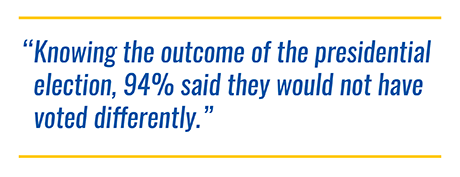Newswise — March 27th, 2017--A new statewide Ohio poll conducted by Baldwin Wallace University finds voters remain deeply divided on many issues in the early days of the Donald Trump administration, including an equal split on whether they trust the president or the media (or neither) to tell the truth.
A majority of Republicans (62 percent) trust President Trump to “tell the truth about important issues” more than the news media, while 66 percent of Democrats trust the media more. Overall, one-third of Ohioans count on Trump for the truth, one-third rely on the media, and 21 percent count on neither. An additional 8 percent trust both equally, while 5 percent are unsure.
The post-election dive into voter attitudes was conducted by BW’s Community Research Institute (CRI) as a faculty-mentored, student-powered polling project in Dr. Lauren Copeland’s “Public Interest Research” political science course. The 23 students in the class designed the survey instrument with media input and continue to crunch the data.
Trump's Tweets
One polling question drew majority agreement: 63 percent say President Trump uses his personal Twitter handle, @realdonaldtrump, too much and more than half (56 percent) believe the president’s use of Twitter is “inappropriate” given his position (one quarter say it is “appropriate” and 19 percent are “unsure”).
“Presidents have a long tradition of speaking directly to the public through the latest communications technology. What’s new is Trump’s use of social media to launch political attacks,” said Copeland, a BW political science professor and associate director of CRI.
A plurality of Republicans (42 percent), most Democrats (85 percent), and a majority of Independents (67 percent) believe that Trump tweets too much.
“This result is interesting to me because I expected the president’s supporters to like his use of Twitter considering they trust him more than the media to provide their news,” observed political science major Sean Williamson ’19.
Little Voter Regret
 Additional results show that regardless of which candidate they supported in November, less than a third of Ohio voters expected Trump to win. But the poll finds scant “buyer’s remorse” among Buckeye State voters today. Knowing the outcome of the presidential election, 94 percent said they would not have voted differently.
Additional results show that regardless of which candidate they supported in November, less than a third of Ohio voters expected Trump to win. But the poll finds scant “buyer’s remorse” among Buckeye State voters today. Knowing the outcome of the presidential election, 94 percent said they would not have voted differently.
That surprised political science major Austin M. Nagy ’17. “As an independent voter with some second thoughts on having voted Libertarian rather than for Secretary [Hillary] Clinton, I expected more people to express regrets not having voted for the Democratic nominee,” said Nagy.
Among those who sat out the election, 46 percent wish they had gotten to the polls, and more than half of those say they would have voted for Clinton (versus 28 percent for Trump).
The survey also found that women were 10 percentage points more likely than men to say that they were reluctant to tell people how they were voting. "I thought that more Trump supporters would be reluctant to share their vote choice,” noted political science major Andrew Henthorn ’19. “I was surprised to find that it was a gender gap instead."
Chasm on Immigration, Border Wall
Attitudes on immigration also continue to polarize the Ohio electorate. Nearly 80 percent of those who agree that “immigrants threaten the safety of Americans” voted for President Trump. Similarly, Trump garnered about 61 percent of the vote among those who believe “we need a stronger barrier along our Southern border.”
“Because we are a nation of immigrants, the belief that immigration threatens our security is puzzling to me,” commented political science major Rachel L. Regula ’18.
Divisions on immigration are especially strong along party lines. Three-quarters of Republicans said they approved of the president’s (original) travel ban for people from seven predominately Muslim nations, and 70 percent of Republicans support the construction of a wall along the U.S.-Mexico border.
In contrast, less than half of the state's Independents and just 20 percent of Democrats approve of the travel ban or the construction of a wall.
"PC” Pushback
People who believed the country needed someone “who is not a career politician to help make the government more transparent" were more likely to vote for Trump. About 60 percent of Trump voters agreed with this statement compared to 34 percent of Clinton voters.
In a similar vein, the poll shows a pushback against “political correctness” with just 29 percent agreeing that “the way people talk needs to change with the times to be more sensitive to people from different backgrounds” versus 69 percent who said people are “a little” or “much too easily offended.”
For political science major Marvin Williams ’17, the experience of helping to manage the survey has opened his eyes to the complexity and depth of statistics. “I am now able to evaluate sources, analyze results, dig into demographic differences and look at the story the numbers tell.”
About this Survey
The CRI’s post-election study was conducted among 1,019 Ohioans, who reported being registered to vote, between February 24 – March 8 using online panel data with quotas in place for age, gender and region. The final data were weighted to reflect the electorate’s level of educational attainment.
Access the complete report
Download results and complete data sets in the PDF report for this CRI survey.
Media Coverage
The survey results were also shared with the news media. See how cleveland.com covered the project: